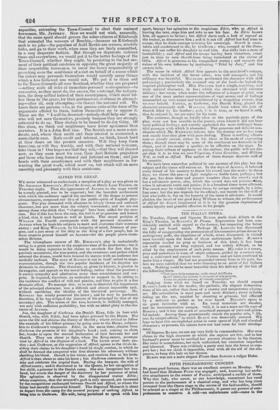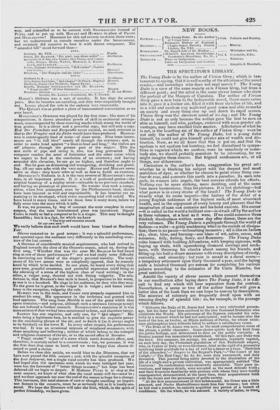FIFTH PHILHARMONIC CONCERT.
By great good fortune, there was an excellent concert on Monday. We had heard that Madame Puzzi was engaged ; and, knowing her exclu- sive attachment to the sweets of PACINI, anticipated a surfeit of them. Why this lady, who never, to our knowledge, committed her vocal powers to the performance of a classical song, and who has long since retreated from the Opera stage to the soirees of the fashionables, should be selected as a singer at the Philharmonic, it passes our powers of com- prehension to conceive. A cold—an unfortunate cold—came in the way, and compelled us to be content with STOCKHAUSEN instead of Fuzz!' and to put up with MozAar and Hummi in place of PAcINI and MERCADANTE! Mourners for this sad reverse no doubt there were ; but we endeavoured to console ourselves under the 'bereavement, and certainly did contrive to bear it with decent composure. The " amended bill" stood forward thus—
ACT I.
Sinfonia, No VIII . Haydn. Scena, Mr. Haan A at, "Per pieta, non dirmi audio" ... Beethoven. Quintetto in E Ilat, two Violins, two Violas, and Violon. . cello, Messrs. MORI, WATTS, MORALT, A. CRIES-
.
BACH, and Lasncsv.. . . . Beethoven. Scena, Madame STOCKHAUSEN, "Deli calms" (tlatilda von liaise) ........... .............. ......... Hommel. Overture, "Der Templar und die judin".... Morschner.
ACT
Sinfonia in A. . . . . Beethoven. Aria, Signor SAD:Tim, Qui sdegno" (II Flautu Magico) Mozart. Fantasia, Corno (La Tyrolien), Signor Puss! Costa. Dnetto, Madame STOCKHAuSaN and Mr. Da " Fuggi crudel" (II Don Giovannl)............ Mozart. Overture, Oberon . C. M. von Weber. Leader, Mr. LODE a—Conductor, Mr. C o 08E.
HAYDN'S Sinfonia was a sort of novelty. It has slept for several years. But its beauties are unfading, and they were exquisitely brought out. Lonna played the solo in the andante very respectably.
The Quintet was as perfect a piece of instrumental conversation as we ever heard.
111sascimaa's Overture was played for the first time: like most of his compositions, it shows abundant proofs of skill in orchestral arrange. ment, unaccompanied by those unerring marks which stamp the works of true genius. It is a clever and a powerful copy, but still only a copy. Had Der Freischiitz and Euryanthe never existed, no such overture as that to Der Templar und die Judin would have been produced. Matsui- NER is extravagantly fond of noise—of sheer noise. Nine brass instru- ments are " in full blow" nearly all through the overture ; and, in order to make head against "a blast so loud and long," the violins are all altissimo through the greater part of the nut:lore. This din and strife of pipe and string is, also, too long protracted. The composer reaches the acme of fortissimo and the other issimi which we expect to find at the conclusion of an overture ; and having ascended this elevation, be can go no higher, and therefore ought to end. But he goes on drumming and trumpeting, shrieking and growl- ing, till our ears ache with the very noise. HAYDN and MOZART never serve us thus : they know when as well as hoto to finish an overture.
BEETHOVEN'S Sinfonia in A is the very reverse of MaascinvEa's over- ture, in all important points. It is a work of profound genius—the original beaming of a mighty mind—referable to no previous standard, and having no prototype or precursor. No wonder that such a compo- sition, when first attempted, even by the Philharmonic band, should have been rejected as wild and impracticable. It has beauties yet re- maining to be developed, which every succeeding trial will unfold. We have heard it many times, and we must hear it many more, before we fully enter into the story which it tells.
It was, we presume, by way of contrast the most complete in every respect, that the next instrumental piece was introduced. Signor COSTA is really as bad a composer as he is a singer. This may be thought Incredible; but it is a fact, for which we have
"The true and sensible avouch Of our own ears."
We verily believe that such trash would have been hissed at Bartlemy Fair.
Oberon restored us to good temper : it was a splendid performance, and operated upon the audience very differently to the concluding over- ture of the last concert.
A German of considerable musical acquirements, who had arrived in England towards the close of the Oratorio season, asked us, during the first song, " Whether that was the same Mr. BRAHAM he bad beard sing at one of those performances ? " and we had really some difficulty In convincing our friend of the singer's personal identity. The testi- mony of his two senses were so completely opposed, that he scarcely knew by which to be decided. In one place, he heard every thing that pure tone, graceful ornament, and powerful expression could bring to the adorning of a scena of the highest class of vocal writing : in the other, a vulgar song, shouted out with fitting vulgarity. The mis- fortune is, that BRAHAM'S best style is heard, in proportion to his worst, as one is to a hundred. He sings to his audience,-be they who they may. To the great he is great, to the vulgar lie is vulgar ; and hence excel- lence is the exception, vulgarity the rule. HUMMEL was in the room, and COOKE very properly requested him to conduct his song. His appearance in the orchestra was greeted with loud applause. The song from Matilda is one of the gems which that opera contains,—and only one, although such a specimen (strange to say) has not induced a further research. STOCKHAIJSEN'S execution of it was moreanimated than we had been accustomed to hear, and therefore better. SANTINI has one requisite, and only one, for " Q111. sdegno." His
voice being a legitimate bass, is enabled to give the requisite power to the concluding phrase of the air, and to finish it (as it always ought to be finished) on the lower E. In every other respect, his performance was bad. It was an occasional mixture of misplaced ornaments, with sheer mouthing and bellowing ; neither of which belong to the tranquil and religious character of the air, or to the sacred office of Sarastro. " Fuggi crudel" is part of a scene which needs dramatic effect, and, therefore, is scarcely suited to a concert-room ; but, we presume, it was the first duet that came to hand, and we were happy that chance di- rected so good a choice.
Before we close this article, we would hint to the Directors, that we have now passed the fifth concert • and, with the splendid exception of the Last Judgment, not a single vocal novelty has been produced. We had hoped that the specimens with which we were indulged last year, were but the foretaste of " better things to come ;" but hope has been deferred till we begin to despair. If Madame Puzzi is to sing at the next concert, we know of what class the vocal music will be—must be ; and we then approach too near the end of the season to hope fora change. This inertness, 'this total absence of care or thought touching an import- ant feature in the concerts, must be as seriously felt as it is loudly cen- sured. We hope the Directors will take the hint, which, in the spirit of perfect friendship, we have given.




























 Previous page
Previous page